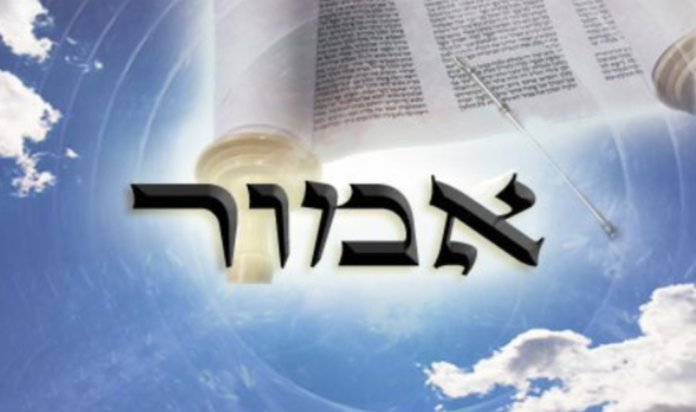This week’s Torah reading begins with laws given especially to the Kohanim, the group among our people that serve in the Beit Hamikdash, and who have more obligations and restrictions than the rest of the nation. They were informed of their obligation to stay away from death and impurity, and of their responsibility to be especially careful to sanctify Hashem’s Name:
And Hashem said to Moshe, “Say to the Kohanim, the children of Aharon, and you shall say to them: ‘He shall not become impure to another person in his nation.'”
-Emor, 21:1
Our Rabbis notes that the verse contains an extra word:
Say… and you shall say to them…
They answer that two sayings are being alluded to here: Moshe told the Kohanim that they should tell the younger Kohanim, their children, about the laws of purity.
Although minors are not generally obligated in the laws on a Torah level (but are rather rabbinically obligated, in conjunction with the father’s duty to train them), their parents were nevertheless instructed to teach them about Kohanim’s unique set of laws.
(See Gemara Yevamot, 114a)
The Midrash also seems to highlight the usage of “Say” in the verse. They link this word to a verse in Tehilim:
The sayings of Hashem are pure sayings. How so? For Hashem warned B’nei Israel for the sake of their holiness and purity.
-Midrash Tanchuma
What exactly does this Midrash mean?
Divrei Sha’arei Chayim (Rav Chaim Sofer, 1821 –1886, Hungary) explains: because B’nei Israel are holy and pure, they must therefore take special care of themselves. This is comparable to a prince who grows up eating the most refined foods. If he were to eat coarse, cheap food, he would get sick. A peasant, on the other hand, eats these foods in abundance but is unaffected. B’nei Israel’s souls are more spiritually sensitive, and so Hashem gives us prohibitions and safeguards to ensure that we do not damage our special inborn quality. Thus, for example, we are forbidden to eat many types of food. We may not enter the Beit Hamikdash or eat holy foods in a state of impurity, and must therefore pay attention to the issues they impurity yields. Kohanim, elevated above the rest of the nation, are actually prohibited altogether from becoming impure. In short, it is because we are already holy that Hashem helps us remain so.
This thought reminds us of the words of the Midrash:
And even the soul is not full…
-Kohelet, 6:7
This is comparable to a villager who marries a princess. If he brings her everything in the world, they’re not worth anything to her, for she is a princess. So is the soul: if you bring her everything all the luxuries in the world they are nothing to her. Why? Because she is from the upper worlds.
-Kohelet Rabbah
-In this same way, the Jewish soul is holier than the non-Jewish one. We must therefore be more aware of our duty to keep it clean and pristine, remembering that it derives pleasure and benefit from spiritual pursuits.
The Toras Gavriel (Rav Gavriel Ze’ev Wolf Margoliyos; Lithuania, United States; 1847-1935) interprets the double language of the verse differently- reading it into the simple meaning of the verse. If a father trains and educates all of his children with the same standards, but is more exacting and demanding of one particular son, the boy will obviously wonder why he is being singled out for this treatment. It behooves the father to first pull his son aside and explain his reason for doing so: “I see that you are especially capable and talented, and so I can expect more of you.” So, too, are the Kohanim addressed. Before they are taught the restrictions that they will face, they are told that they are uniquely suited to keeping extra prohibitions.
As such, the verse reads:
“Say to the Kohanim that they are the sons of Aharon,” meaning that they come from the special lineage of Aharon, “and (then) you shall tell them” not to become impure.
Amazing. Only after establishing the strength of their roots should they be informed of their additional responsibilities.
May we always remember the proper way to educate our children- and ourselves- being conscious of our innate holiness, and recognizing Torah law not as a burden but a privilege.
Have a great Shabbat!
Elli
Elli Schwarcz is an alumnus of the Toras Moshe, Ner Israel, and Carteret Yeshivos, and has been involved in Jewish outreach for almost 15 years. He is a Hebrew School and English Language Arts teacher, and has a Master’s Degree in Counseling from Johns Hopkins University. Of all his pursuits, Elli most enjoys teaching high-level Jewish thought and Talmud to teenage boys, exposing them to the beauty and wisdom of their heritage while highlighting their own ability to engage in advanced Torah learning. Elli lives in Lakewood, New Jersey, with his wife and children.





